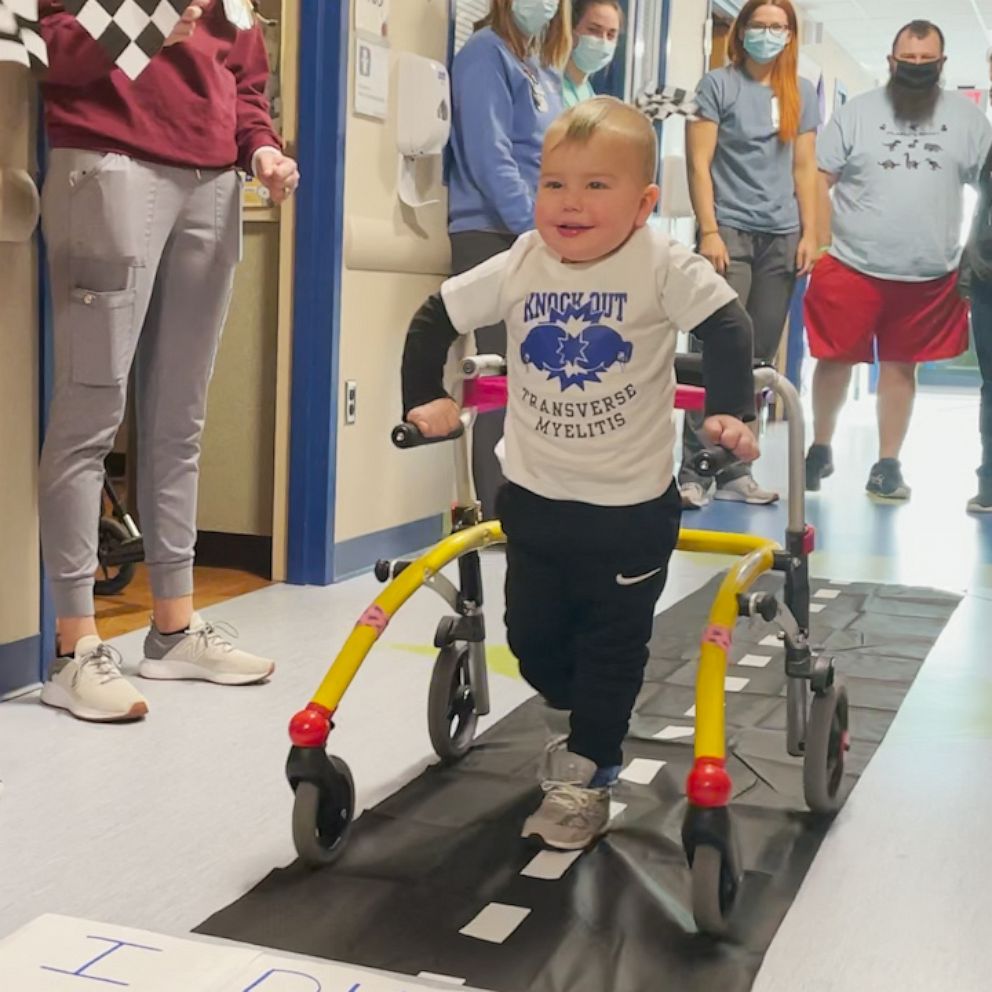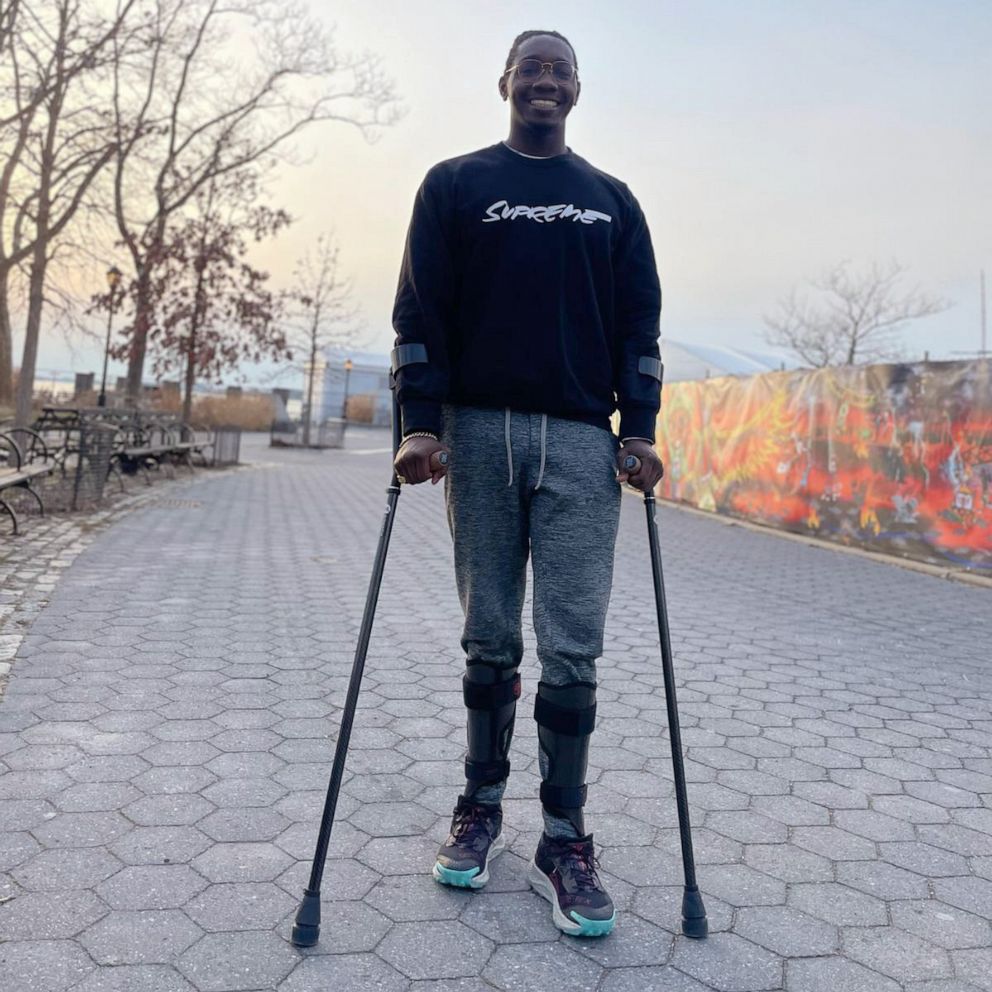Woman paralyzed after fall learns to walk again alongside 1-year-old daughter
Leah Weiher was left paralyzed after falling from a hunting stand.
A mom in Ohio is who was paralyzed from the waist down after falling from a tree stand is taking her first steps again, right alongside her 1-year-old daughter.
"Not a lot of mothers can say that they learned to walk at the same time as their child, so it's very special," Leah Weiher of Galloway, Ohio, told "Good Morning America." "It's a good thing out of a bad situation."
Weiher, 24, was climbing onto a tree stand early in the morning on Nov. 5, 2023, when she stumbled and fell 15 feet to the ground, landing on the crossbow she was carrying with her.
Weiher, who had just given birth to her daughter Laken 10 months prior, said she immediately felt her body go numb.
"I just started going numb from my feet and up and it just kept coming up and up, and I was like, 'Am I just dying? Like am I going to go completely numb everywhere and just stop breathing?,'" Weiher said. "I knew if [I was] not dying, that I was severely injured because I'd never felt anything even close to that before."
Once she was transported to a local hospital by ambulance, Weiher said doctors told her she had fractured her L2 vertebra, located in the lumbar spine.

Weiher said she chose to undergo surgery as that was her only hope of being able to walk again.
After a seven-hour surgery, Weiher spent eight days in the hospital and over one month at the Ohio State Dodd Rehabilitation Hospital, where she did at least three hours of intense therapy daily to try to walk again.
Weiher said shortly after getting to the rehab hospital, she was able to wiggle one toe on her left leg, which she said was her first sign of hope.
"But it was still up in the air. Even all the therapists there told me, 'You could completely stop progress-wise where you are now, or you can completely progress and walk in the next year,'" Weiher recalled. "So, no one could really tell me anything. I didn't know. It was just hope."
Weiher said what kept her going on hard days, not knowing what her future held, was her daughter, who was just learning to walk herself.
"Laken has been my motivation. She's been my reason," Weiher said. "Probably the second hardest thing about this whole entire thing was me feeling like I couldn't be a mom anymore, like I was not doing my best at it, or I was letting her down in any way."

When Weiher was discharged from the rehabilitation hospital just before Christmas, she was in a wheelchair and had to adjust to being back home without being able to do most things by herself.
She began outpatient physical therapy shortly thereafter, and slowly gained the strength to stand on her own, then take a few steps.
After celebrating Laken's first birthday in January, Weiher said she gained an extra motivation to be able to walk and keep up with her daughter.

When Laken took her own first steps in early March, Weiher began walking again too.
"At that point, I could stand up and barely put one foot in front of the other really, really slow, and just take a couple of steps," Weiher said. "I've gotten a lot better now and can go a lot further now, and so can she. She's everywhere now, running around."
Of their first steps together, she added, "But it was amazing, just sharing that experience together."

Casey Perch, a neurological physical therapist who works with Weiher at the Ohio State University Wexner Medical Center Outpatient Neurologic Rehabilitation center, said he saw Weiher's motivation firsthand when Laken began to join her mom at some of her therapy sessions.

"That's when it really hit me, when Laken was learning to walk during the session as I was teaching her mom to do some of the same stuff," Perch said. "She wants to be there for her daughter, which is a huge motivation for her."
With her daughter as her motivation, Weiher is further along than anyone expected, according to Perch, who said he is just one part of a team that has gotten Weiher to where she is today.
"She has just blown away all my initial goals of where she should be by now," Perch said. "The first time we walked, she walked two feet. Two months later, we walked for six minutes continuously with no assisted device."
"That's a huge testament to the work that she does here. This stuff isn't easy. She's putting in the effort, not me," he continued. "I can design a program focused around a research-based approach, but she's got to be the one that does it, and she does. She comes in and puts in the work and then goes home and does more."

Weiher said she hopes to increase her weekly physical therapy sessions so she can continue to improve and keep pace with Laken.
"I'm a perfect example of miracles do happen and putting in the work makes it happen," Weiher said. "I'm not really sure if I would have worked as hard if I didn't have [Laken] ... There were more bad days than good I would say, in the very beginning, and she's the only thing that I could think of when I didn't want to get up or I just didn't want to do anything, and I had to."







